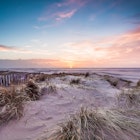

Spectacular beaches like Portelet on Jersey are one of many reasons to visit the Channel Islands © Doug Pearson / Getty Images
The Channel Islands sit between Britain and France, loyal subjects of Her Majesty but lying just off the French coast; British citizens but living in a warmer, sunnier climate than the UK and with local dialects originating in medieval Norman. The weather draws outdoorsy types for hiking, surfing, kayaking, coasteering and diving, ancient remains appeal to historians, and there’s plenty for gourmets as well, from superb local seafood to delicious ice cream made with the rich milk of the ‘Jersey girls’.

Add to that a cluster of creeper-covered castles, crumbling coastal forts, poignant WWII museums, world-class sandy beaches, cobbled streets and shaded country lanes, and the Channel Islands can keep you busy for quite some time.
A jaunt around Jersey
Jersey, the largest of the Channel Islands, has a lot to offer and whether you’re exploring by cycling its designated Green Lanes or driving a vintage car from Jersey Classic Car Hire, don’t miss the following. On the east coast, explore Mont Orgueil Castle, then duck inland to check out the neolithic grave and coin hoard at Hougue Bie. Watch sea water shoot out of the Devil’s Hole on the north coast and go cider- and wine-tasting at the La Mare Wine Estate. Drive the longest, straight stretch of beach along the west coast, watch the sea batter the Corbière Lighthouse and sun yourself on Portelet Beach – Jersey’s loveliest. On the way back to St Helier, walk or take an amphibious vehicle across to Elizabeth Castle before finishing off with dinner in Jersey’s lively capital.

On a mission – Jersey Zoo
Founded by writer and naturalist Gerald Durrell in 1959, Jersey Zoo is considered to be one of the world’s best. Endangered creatures such as Andean bears, orangutans and lowland gorillas roam the spacious, forested enclosures, while the more arid and tropical habitats house the critically endangered ploughshare tortoise from Madagascar, 'mountain chicken' frog from Montserrat and Dominica, and the blue iguana from the Cayman Islands. The zoo continues to play an important role in the conservation and breeding of species that are under threat, and their reintroduction into the wild.
Guernsey by bike
The flattest of the Channel Islands, with priority given to cyclists along the numerous Ruettes Tranquilles (peaceful lanes), Guernsey is perfect for exploration on two wheels. The Creux ès Faies neolithic grave, the Fort Grey and Shipwreck Museum and the remote, tide-dependent Lihou Island beckon on the west coast. En route from St Peter Port, the capital, you can swing by the stately Sausmarez Manor and check out the millennia-old Gran'mère du Chimquière menhir outside St Martin’s Church. The north coast is all about the beaches – Pemboke Bay, Vazon Bay, Côbo Bay – and if you head east, you can visit the Déhus Dolmen, a large Neolithic grave complete with a bearded tomb guardian.

Herm – car-free tranquility
Tiny, traffic-free Herm is a favourite with day trippers from Guernsey. A 40-minute ride by boat from the latter’s St Peter Port, this hilly island can be circumnavigated on foot in a couple of hours. Apart from the scenic walking trails, attractions include the world-class Shell Beach, lapped at by azure waters. Herm is also an important RAMSAR site (wetland of international importance): birdwatchers come here to observe puffins and other protected seabirds. History buffs may wish to wander around the flat grasslands of the north end of the island, dotted with neolithic tombs.
Stargazing in Sark
Sark feels like a step back in time. Ruled by a succession of hereditary seigneurs since 1563, it was Europe’s last feudal state until 2008. These days, horse-drawn buggies and cyclists ply its unpaved country lanes, gently passing tall cliffs and sweeping bays filled with powder-white sand. Measuring 3 miles by 1.5 miles, the island is easy to explore independently, though it’s well worth taking a horse-drawn carriage tour to see the main highlights. Don’t miss La Coupée (the narrow land bridge connecting Big Sark to Little Sark), swimming in the tide-filled Venus Pool at the southern end of Little Sark, the exotic plants in the Seigneurie Gardens or a peek at the beautiful Port du Moulin beach through the Window in the Rock. On clear nights, the skies above Sark – the world’s first designated Dark Sky Island due to absence of light pollution – beckon stargazers.

Away from it all in Alderney
The remotest of the Channel Islands, Alderney has a very distinctive character. The island was ringed with a string of forts during Victorian times to fend off the French, and during WWII was heavily militarised by the Nazis (see below). These crumbling fortifications are particularly worth exploring, history buff or not, as circling the island on a bike or walking the 10-mile coastal footpath allows you to appreciate the beauty of its beaches, Saye Bay, Bray Bay and Corblets Bay in particular. If you’re a nature lover, boat trips to Les Etacs gannet colony off the coast are highly recommended, while on land you might spot ‘blondies’, the local blond hedgehogs. The low-key village, St Anne, is a tranquil place to base yourself.
World War II relics
During WWII, the Channel Islands were the only British territory to come under Nazi occupation. There are sobering memorials on every island, from the remains of the Lager Sylt concentration camp on Alderney and the stories of Guernsey POWs collected by the German Occupation Museum on Guernsey, to the wealth of wartime memorabilia at Guernsey’s La Vallette Underground Military Museum and the Channel Islands Military Museum on Jersey. The most poignant of the lot, however, are the Jersey War Tunnels, the remains of a Nazi underground hospital converted into an interactive museum. The exhibits walk you through the privations suffered by the islanders, the Eastern European slave labour used in Nazi construction projects, courageous rebellions against the Nazis by locals, deportations of British-born islanders to Germany and the Channel Islands’ subsequent liberation.

Seafood heaven
The Channel Islands are renowned for their excellent, seafood-heavy dining scene, with specialities such as the sweet little oysters grown off Herm, scallops and crabs from the coasts of Jersey and Guernsey, and Sark lobster. You can sample them at some of the islands’ finest restaurants such as Samphire, Bohemia and Longueville Manor on Jersey, Sark’s La Sablonnerie, the refined restaurant at Herm’s White House Hotel, Guernsey’s Le Nautique, Hook and Reunion, and Georgian House on Alderney, among others.
Explore related stories


 HikingFrom rugged coasts to ancient hills, these are the best hikes in the UK
HikingFrom rugged coasts to ancient hills, these are the best hikes in the UKJun 30, 2022 • 9 min read

 Budget TravelThe secret to getting the best airfare deals to these destinations in 2020
Budget TravelThe secret to getting the best airfare deals to these destinations in 2020Dec 12, 2019 • 2 min read



